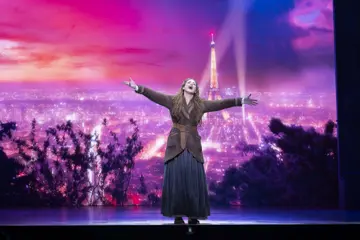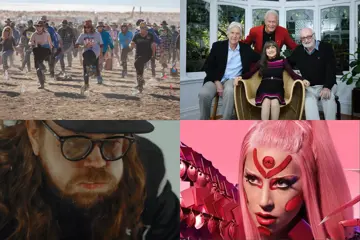The least intelligent criticism anyone has ever offered, anywhere, ever, on any film, ever, is “nothing happened.” So, it's been sad/painful/depressing/galling/etc to hear it uttered, again and again, at MIFF; it, as always, making me feel as if most moviegoers ideas of “something” are solely when people get shot and/or shit explodes. It's especially sad when it comes at the end of, say, The Loneliest Planet, one of the most singular pieces of enveloping environmental cinema I've ever felt blessed to experience; a film whose complete absence of exposition betrays the fact that so much is happening beneath the surface. For me, that's one of the true joys of MIFF: just how many films respect the sanctity of cinema and give the viewers the gracious sanctuary of space. Space to think, of course; and if for some that's 'nothing', the nothingness is the absence of thoughtfulness inside their own heads.
Tuesday 14 August
Carré Blanc (9pm, GU 3): Visions of dystopian futureworlds don't get more grim than Jean-Baptiste Leonetti's debut; a slate-grey procession of tower blocks and institutions in which society has the feeling of a lab experiment, and even that ultimate rebellion —suicide— has been coopted by the omnipotent powers-that-be.
Facing Mirrors (4pm, ACMI 2): Whilst a noble social crusade —furthering notions of feminism, gender fluidity, and anti-patriarchal rebellion in defiance of conservative Islam— this Iranian film feels far more worthy for its morals than for its artistic mettle; the drama driving the themes having an unsophisticated, almost sophomoric feel.
Himizu (9pm, GU 5): At his best —wait, maybe this should be 'best'— Sion Sono makes films that delight in being wilfully perverse; whose strangeness is their best quality, and whose descents into darkness carry with them a giddy joy of transgression. So, to have him make a post-apocalyptic picture that takes the nuclear terror of the 2011 Japanese earthquake as its starting point, well, that sounds great, right? Except Himizu is almost unwatchably annoying, its collection of screeching, hysterical, and zany caricatures all badly-written and headache-inducing.
Don't miss a beat with our FREE daily newsletter
Holy Motors (6.30pm, Forum): One of the highlights of the cinematic year, Holy Motors is a film of breathtaking style, defiant singularity, and inscrutable symbolism; set in an alternate reality all its own; a dreamworld in which the world almost functions as cinema, in which players are immortal and tragedy is outed act for those in privilege; and maybe 'reality' is a place where we all live with apes. And also Kylie Minogue sings, Denis Lavant literally chews the scenery, and white limousines have lives of their own. After 13 years in the wilderness, Leos Carax has returned with his magnum opus.
Lovers On The Bridge (11am, Forum): Carax's third feature was a wildly-ambitious picture whose production involved taking over the Pont Neuf; the bridge providing the romantic sanctuary for a pair of star-cross'd street urchins —twin Carax muses Lavant and Juliette Binoche— who've clawed out of an oddball Parisian underworld.
Low Life (9pm, Kino): Nicolas Klotz and Elisabeth Perceval's follow-up to their inspired La Question Humaine (and/or Heartbeat Detector) sometimes borders on a satirical parade of impossibly-attractive-young-ideologues spouting delusional revolutionary rhetoric with soap operatic élan. Yet they're soon swallowed by a wondrous darkness; the tale descending into an eternally nocturnal underworld is Sarkozy's France as dystopian nightmare.
Patience (After Sebald) (6.30pm, ACMI 2): Grant Gee's ambling, itinerate essay movie —a series of half-dreamt black-and-white landscapes from Sussex, overlaid with the voices of yr typical talking heads— takes its cues from The Rings Of Saturn, the W.G. Sebald book that is the inspiration for it and all te fervent devotees who philosophise and rhapsodise the tome within. Patience (After Sebald) is effectively preaching to that choir; someone dropping the term 'Sebaldian' about five minutes in as if it's a warm and familiar thought.
Safety Not Guaranteed (9pm, ACMI 2): Though bound to be overpraised due to its American-indie status, Colin Trevorrow's picture is plenty charming nonetheless. A tale of time-travel, shitty jobs, and Aubrey Plaza's hotness, it's a familiar-feeling three-act indie-comedy that takes a widely-mocked meme and gives it the benefit of the doubt; peering behind modern culture's ravenous schadenfreude and finding shared humanity. And, y'know, a time machine.
Wednesday 15 August
Bestiaire (4pm, ACMI 2): Denis Côté's series of silent, single-take portraits of animals in enclosures achieves a meditative cinematic state; viewers invited to muse on the wonder of life, the nature of beasts, the dominion of man, the imprisoned creature, and the inevitable, imminent end of the world.
Certain People (6.30pm, Kino): So-so Swedish theatre-piece in which a crew of old, 30-something pals commune for a birthday party and, predictable, descend into rehashing old conflicts, digging up skeletons, spilling secrets, and generally tearing down the polite façade of society for one drunken, volatile night.
Charles Bradley: Soul Of America (4.30pm, Kino): If the word 'inspirational', when used to shill movies, sends shivers down your spine —as it does mine— hightail it past Charles Bradley; a mediocre, bonus-DVD-worthy music documentary of a newly-discovered 60-something soul singer whose desperation to make its subject 'inspirational' has all the subtlety of some tear-streaked current-affairs-show segment.
Dark Horse (9pm, GU 3): Todd Solondz's latest is seemingly, at first, a minor comic trifle, in which his familiar themes of suburban grotesquerie seem to be merely lacing a broad comedy. But the further things go, the stranger they get; to the point where its final act consists solely of narrative misdirection, the confusion out to illustrate the fact that each individual authors their own life story like some piece of ongoing, malleable fiction.
Girimunho (6.30pm, GU 4): Minor work of ethnographic cinema chronicles a tiny Brazilian town as seen through the eyes of an aging matriarch; there plenty of gentle naturalism but nothing coherent or vital becoming of it.
The King Of Pigs (9pm, GU 4): Though it'll get bonus praise due simply to being an animation —and, thus, being one of those ever-scarce animations-for-adults— Yuen Sang-ho's film is genuinely reprehensible; its portrait of a Lord Of The Flies-esque high-school pecking-order not merely depicting brutality, violence, misogyny, and hyper-masculinity, but indulging —and, indeed, reinforcing— the same. Also: never a good sign when your twist ending is so stupid it makes people laugh out loud.
The Loneliest Planet (9pm, Forum): Anyone interested in that kind of hyper-present cinematic phenomonolgy —in which watching a film makes you feel as if you are experiencing being in a place— will freak out over the glories of The Loneliest Planet, one of the most immersive pieces of environmental cinema ever authored. There's not a single line of exposition in the entire film, and barely anything resembling traditional 'plot'; instead Julia Loktev's camera follows a pair of backpackers and their guide walking through the Georgian mountains. It's, in many ways, tourism-porn for serial adventurers, but there's a darkness lurking throughout; in both the mythical landscape and the tiny, transient human figures passing through. A true MIFF highlight.
Marina Abramović: The Artist Is Present (6.30pm, GU 6): The Godmother of performance art is chronicled in a documentary that feels both minor and masterful, throwaway and unforgettable. It's a functional portrait of Abramović in the lead-up to a career retrospective in 2010, and though it skips a little swiftly over her career, it is blessed to bear witness to the titular work; this not-great film somehow feeling great by dint of being in the presence of greatness.
Our Children (6.30pm, GU 5): It's funny to 'recommend' a film whose final reel is horrendously brutal, but Joachim Lafosse's is, if measured solely by slowly-building psychological claustrophobia, a towering tour-de-force; beginning sunny and optimistic before methodically smothering any and all notes of hope.
Whores' Glory (9pm, Kino): In one of the most astonishing scenes of Michael Glawogger's portrait of third-world prostitution —a film verily stuffed with astonishing scenes— a Bangladeshi bro talks about how the hellish whores' gulag in his hood is a positive thing for the local community. Whether his words betray blind ignorance or steep cultural difference is up for debate; and there's plenty to talk about in Glawogger's third picture in a documentary 'trilogy' —succeeding the amazing Megacities and Workingman's Death— on the nature of labour in the globalised world.
Thursday 16 August
Alois Nebel (1.30pm, ACMI 2): The animation section is tucked away at the end of the MIFF catalogue, a tiny, half-forgotten niche that plays to an audience of devoted acolytes. This Czech production is a piece of classic fest-ready animation: a dark slice of black-and-white, graphic-art-esque storytelling (for adults!) tinged with war, tragedy, violence, and allusions to noir films.
Metropia (9pm, Kino): There's shades of Richard Linklater's A Scanner Darkly adaptation in this Swedish antimation; a near-future paranoia thriller in which all is not what it seems and a corporatised big-brother has its subliminal tendrils deep in a modern European state.
Nana (6.30pm, Kino): Glorious piece of rural naturalism —equal parts sweet and savage— that watches a small child at play on a French farm; Valerie Massadian's debut picture a piece of direct cinema that deals in the child's fantastical view of the world around them.
Oslo, 31. August (11am, Forum): There's an amazing scene in Joachim Trier's existential angst-piece where our main character —a suicidal, intellectual ex-junkie back in Olso on a rehab day leave— eavesdrops on a pair of young women reading out lists of their life goals; their naivety (“keep up with friends” takes, herein, a particularly irony) standing in sweet contrast to our anti-hero. They have everything to live for, he, at least in his own mind, has nothing. The film is, at a thematic level, unremittingly bleak, but it's beautifully shot and filled with fleeting joys; equally alive to life and death.
Pink Ribbons, Inc. (4pm, Forum): The “tyranny of cheerfulness” in the breast cancer movement —in which a perky, prim-and-pretty face is worn like a hideous, grinning visage— has, effectively, robbed women of a rightful voice of anger, and stolen the horror from a grim, disfiguring disease. Léa Pool's documentary is, in riposte, filled with righteous, vital anger; out to take down the billion-dollar 'breast cancer awareness' industry as a marketing angle out to line corporate coffers.
Rampart (1.30pm, Forum): If there was an award for Worst Direction amongst the MIFF program, Oren Moverman would have to be a sure favourite. The James Eallroy-penned tale of cops dirty and dirtier could've been made into some stern noir picture, but Moverman has some embarrassing hopes of 'realism' in his head; and somehow equates a shaky, hand-held camera therewith. So, in order to get as 'real' as possible, he whips and wobbles the camera around as much as possible, to the point where it feels impossibly stagy; the scenery-chewing —yet dressed-down!— celebrity thesps actually pausing to wait for the camera to whip around to them, etc.
Tropicália (4.30pm, Kino): I feel like I should offer some kind of caveat to those who may not be fans of Gilberto Gil, Gal Costa, Caetano Veloso, et al, re: watching this documentary recollection of the dawning of tropicalismo. But, then again, if you're not a fan of righteous late-'60s Brazilian psychedelia —of some of the greatest longplaying records ever made— then who really cares about you.















